In a world where data reigns supreme and competition is fierce, businesses are constantly searching for that extra edge that propels them ahead. Enter the game-changer which is the product intelligence platform.
Brace yourself for a journey that delves into the heart of this transformative platform, unraveling its secrets and revealing the untapped potential it holds.
In this blog, we embark on an exhilarating journey to explore the limitless possibilities that a Product Intelligence platform offers, igniting your business’s potential for growth, innovation, and unmatched success.
Let’s start on this adventure together and unlock new horizons of business excellence!
What Is Product Intelligence Platform?
A Product intelligence platform is a sophisticated software solution that enables businesses to transform raw data into meaningful insights, guiding them in making data-driven decisions to stay competitive, meet customer demands, and achieve long-term success. The product intelligence tool helps to gather, process, and analyze large volumes of data related to products, customers, and market dynamics.
Moreover, this platform integrates various data sources, including sales channels, customer feedback, competitor information, market trends, and social media, to provide a comprehensive view of the product landscape. It enables businesses to extract valuable insights from this data and make informed decisions to enhance product strategies, improve customer experiences, and drive business growth.
How Does Product Intelligence Software Work?
Product Intelligence software utilizes a combination of advanced technologies and algorithms to collect, process, and analyze data from various sources. By leveraging the power of data analytics, machine learning, and automation, product intelligence software enables businesses to gain a deeper understanding of their products, customers, and market dynamics.
It empowers them to make data-driven decisions, optimize product strategies, improve customer experiences, and stay ahead in today’s competitive business landscape. Here’s a general overview of how Product Intelligence software typically works:
Phrase 1: Data Collection
The software gathers data from diverse sources, such as eCommerce platforms, customer feedback channels, social media, competitor websites, market research reports, and more. This data may include product attributes, customer reviews, sales data, pricing information, competitor data, and market trends.
Phrase 2: Data Integration
The collected data is then integrated into a centralized repository, consolidating information from different sources into a unified view. This integration ensures that the software has access to a comprehensive and up-to-date dataset.
Phrase 3: Data Cleansing and Preprocessing
The software performs data cleansing and preprocessing techniques to ensure data quality and consistency. This step involves removing duplicates, correcting errors, standardizing formats, and transforming data into a suitable structure for analysis.
Phrase 4: Data Analysis and Modeling
Advanced algorithms and analytics are applied to the cleansed data to uncover patterns, trends, and correlations. This analysis includes techniques such as machine learning, natural language processing, sentiment analysis, clustering, and predictive modeling. The software may use predefined models or develop custom models based on the specific needs and objectives of the business.
Phrase 5: Insights Generation
The software generates actionable insights from the analyzed data. These insights can include product performance metrics, customer sentiment analysis, market trends, competitive intelligence, pricing optimization suggestions, demand forecasting, and more. The insights are presented in user-friendly dashboards, reports, or visualizations for easy interpretation and decision-making.
Phrase 6: Recommendations and Decision Support
Based on the generated insights, the software provides recommendations and decision support to guide strategic planning and decision-making processes. These recommendations can include product portfolio optimization, pricing adjustments, marketing campaign strategies, new product development opportunities, and customer experience enhancements.
Phrase 7: Continuous Monitoring and Iteration
Product Intelligence software often includes monitoring capabilities to track ongoing product performance, market changes, and customer sentiment. This allows businesses to continually refine their strategies and adapt to evolving market conditions. The software may provide alerts, notifications, or periodic reports to keep stakeholders informed of important changes or opportunities.
What Are the Features of a Product Intelligence Platform?
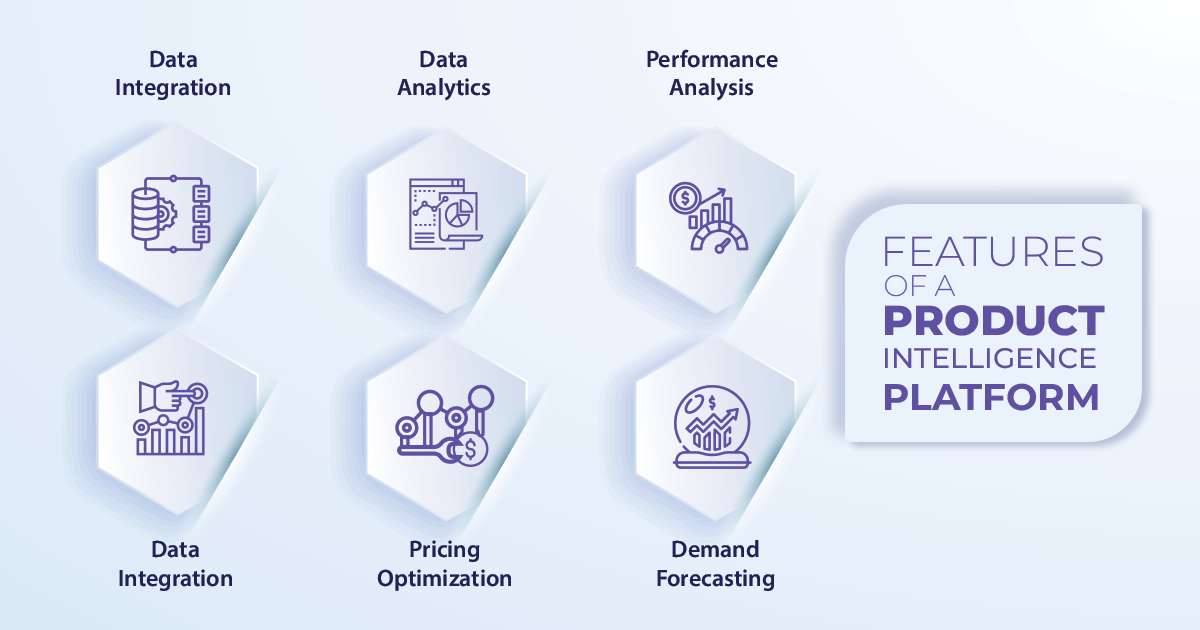
A Product intelligence platform typically offers a range of features and functionalities to empower businesses with actionable insights and support strategic decision-making. By leveraging these capabilities, product intelligence platforms enable businesses to make data-driven decisions, optimize product strategies, enhance customer experiences, and drive growth.
Now, let’s explore the key features that make product intelligence platforms an indispensable tool for modern businesses.
Data Integration
The platform integrates data from various sources, such as e-commerce platforms, customer feedback channels, competitor websites, social media, and market research reports. This ensures a comprehensive and unified view of product-related information.
Data Analytics
Advanced analytics capabilities are used to process and analyze the integrated data. This includes techniques like machine learning, natural language processing, sentiment analysis, clustering, and predictive modeling to extract meaningful insights from the data.
Product Performance Analysis
The platform provides metrics and analysis on product performance, including sales data, revenue, profitability, customer reviews, ratings, and returns. This helps businesses understand how their products are performing in the market.
Customer Insights
Product Intelligence platforms offer customer-centric insights by analyzing customer feedback, sentiment, preferences, and behavior. This helps businesses identify customer needs, pain points, and satisfaction levels, enabling them to enhance customer experiences and tailor products accordingly.
Competitive Intelligence
The platform monitors and analyzes competitor products, pricing strategies, marketing campaigns, and market trends. This information allows businesses to stay informed about the competitive landscape and make informed decisions to stay ahead of competitors.
Market Trend Analysis
Product Intelligence platforms track and analyze market trends, consumer behavior, emerging product categories, and shifts in demand. This helps businesses identify new opportunities, adjust their product strategies, and capitalize on emerging market trends.
Pricing Optimization
The platform assists in optimizing pricing strategies by analyzing market dynamics, competitor pricing, customer behavior, and demand patterns. It provides insights and recommendations for pricing adjustments to maximize profitability.
Demand Forecasting
By leveraging historical data and predictive analytics, Product Intelligence platforms offer demand forecasting capabilities. This helps businesses anticipate future demand, optimize inventory management, and ensure product availability.
Product Lifecycle Management
The platform supports product lifecycle management by tracking product performance from development to retirement. It helps businesses identify opportunities for product enhancements, updates, or discontinuations based on data-driven insights.
Reporting and Visualization
Product Intelligence platforms provide intuitive dashboards, reports, and visualizations to present insights in a user-friendly manner. This allows stakeholders to easily interpret and share key findings within the organization.
Alerting and Notifications
Some platforms offer alerting and notification functionalities to keep businesses informed about important changes, such as shifts in customer sentiment, competitor activities, or market trends. This enables proactive decision-making and timely actions.
Benefits of Using Product Intelligence Software
In today’s data-driven business landscape, gaining a competitive edge requires actionable insights and a deep understanding of products, customers, and market dynamics.
Product Intelligence software unlocks the power of data analytics, machine learning, and automation to provide businesses with comprehensive visibility and strategic guidance. Now, let’s explore the remarkable benefits that Product Intelligence software brings to the table.
Improved Data-Driven Decision Making
Product Intelligence software enables businesses to make decisions based on accurate, real-time data and insights. This eliminates guesswork and empowers teams to make informed choices that align with market trends, customer preferences, and business goals.
Enhanced Product Development
By analyzing customer feedback, market trends, and competitor offerings, Product Intelligence software helps businesses identify product gaps, uncover unmet needs, and prioritize new features or enhancements. This leads to more successful and customer-centric product development initiatives.
Improved Customer Experiences
Product Intelligence software provides insights into customer sentiment, feedback, and preferences. This allows businesses to understand their customers better, personalize experiences, and deliver products that truly resonate with their target audience.
Ensured Pricing Optimization
By analyzing market dynamics, customer behavior, and competitor pricing, Product Intelligence software helps businesses optimize their pricing strategies. This ensures that products are competitively priced, maximizing profitability while satisfying customer demand.
Demand Forecasting and Inventory Management
With predictive analytics and demand forecasting capabilities, businesses can anticipate market demand, optimize inventory levels, and ensure timely availability of products. This minimizes stockouts, reduces inventory costs, and improves overall supply chain efficiency.
Market Trend Identification
Product Intelligence software identifies emerging market trends, consumer preferences, and shifts in demand. Businesses can leverage these insights to adapt their strategies, introduce innovative products, and stay ahead of evolving market dynamics.
Make Sure Operational Efficiency
Automation and streamlined workflows provided by Product Intelligence software enhance operational efficiency. Businesses can save time and resources by automating data collection, analysis, and reporting processes, enabling teams to focus on value-added tasks.
Risk Mitigation
By closely monitoring customer sentiment, product performance, and market trends, businesses can proactively identify and address potential risks or issues. This allows for timely interventions, minimizing the impact on customer satisfaction and overall business performance.
5 Best Product Intelligence Platforms
In the vast landscape of Product Intelligence platforms, it’s crucial to identify the top contenders that provide exceptional value to businesses.
These platforms offer a range of powerful tools and analytical capabilities that empower businesses to gain deep insights into their products, customers, and market dynamics. By harnessing the power of data, these platforms enable informed decision-making, strategy optimization, and enhanced customer experiences.
Now, let’s delve into the realm of Product Intelligence and discover the 5 platforms that stand out from the crowd, setting the standard for excellence in the industry.
Statwide
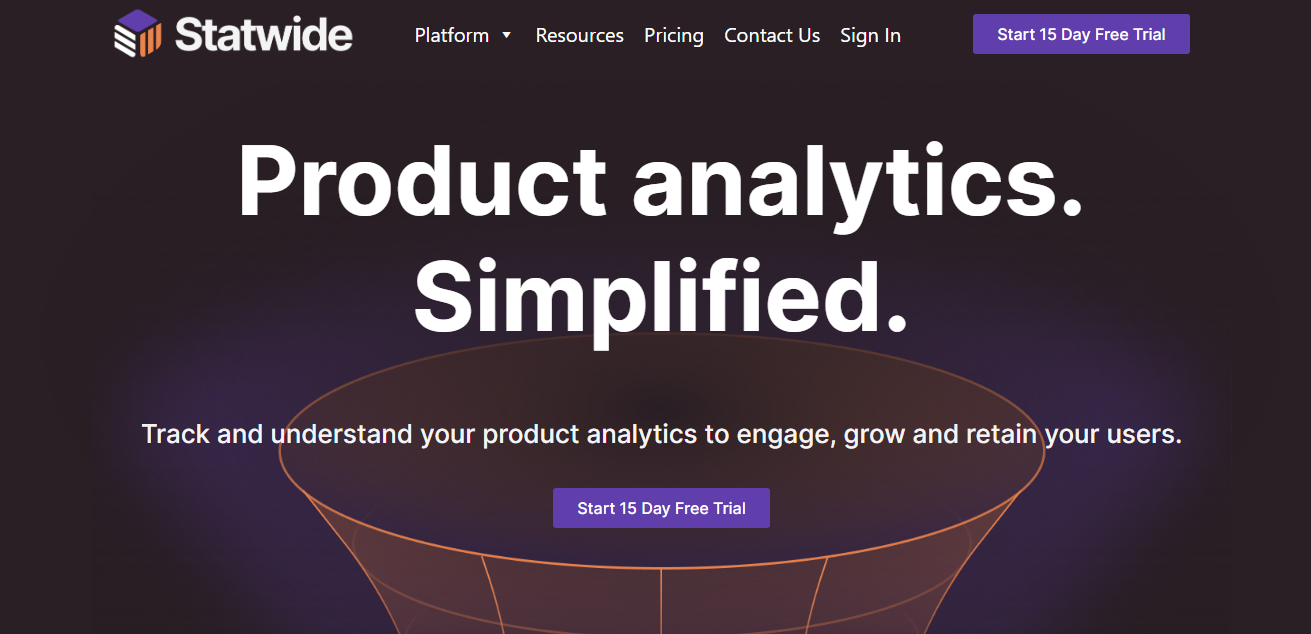
Statwide is a powerful product intelligence software that empowers businesses with comprehensive insights into their products, customers, and market dynamics. With its advanced analytics capabilities and data-driven approach, Statwide enables businesses to make informed decisions, optimize product strategies, and drive growth.
Amplitude
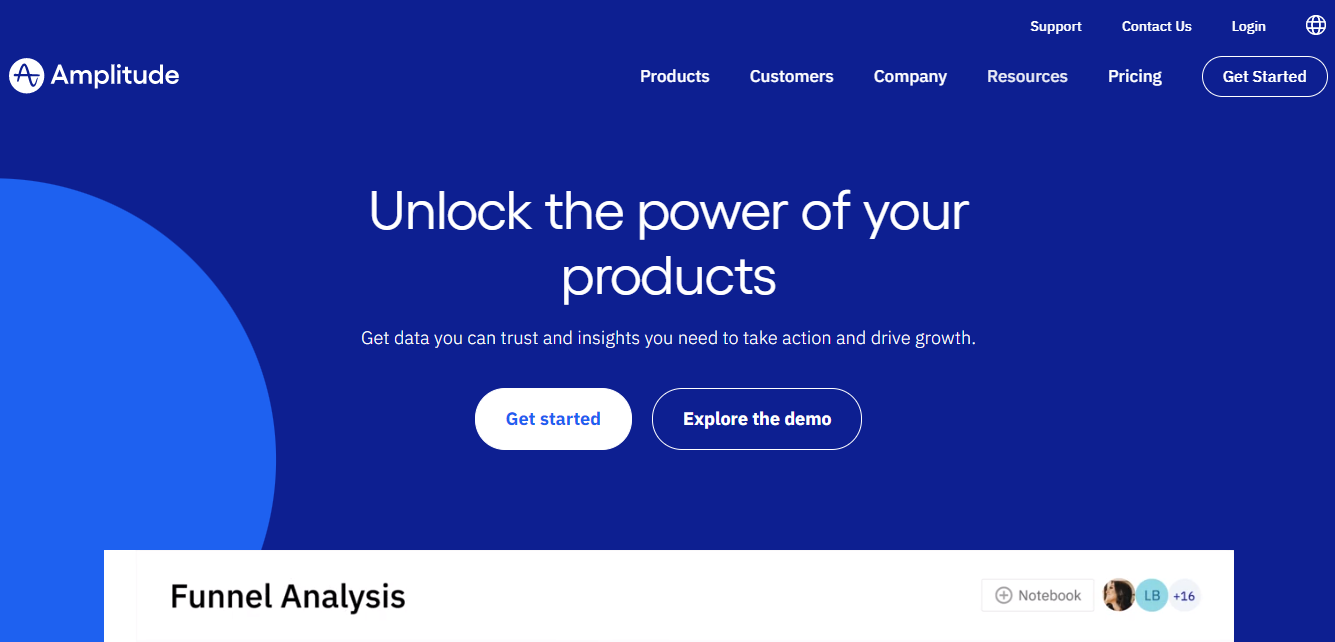
Amplitude is a comprehensive product intelligence platform that helps businesses understand user behavior, optimize product experiences, and drive growth. It offers robust analytics, user segmentation, and predictive insights to enable data-driven decision-making across the product lifecycle.
According to the analysis of Amplitude,
“The product intelligence tool helps to grow your business 5.5 times faster and around 25% of yearly revenue compare to those who aren’t using it.” Source
Pendo
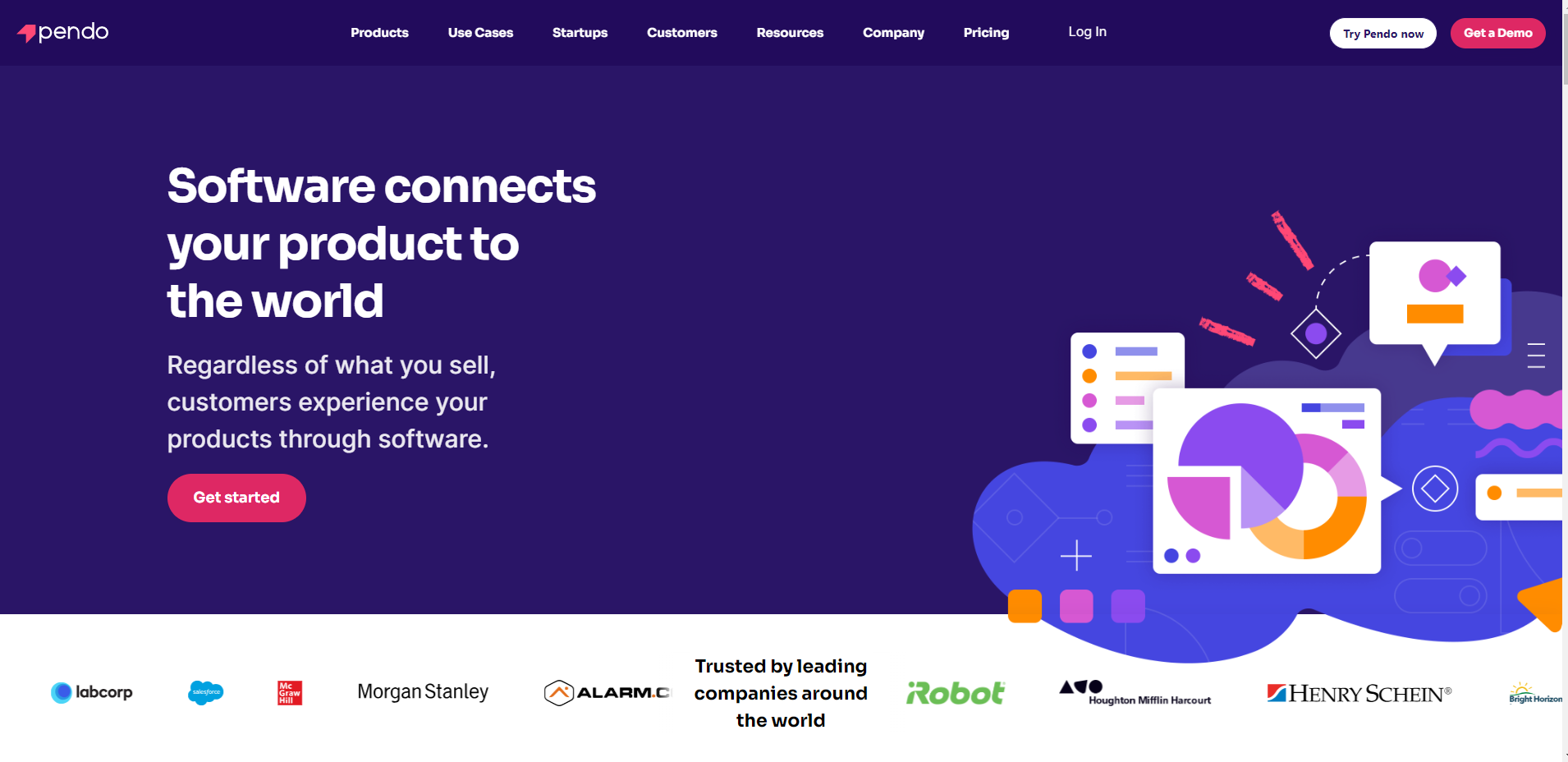
Pendo is a product analytics and user feedback tool that empowers businesses to understand product usage, gather customer feedback, and drive product adoption. It provides valuable insights to improve user experiences, prioritize product enhancements, and boost customer satisfaction.
Mixpanel
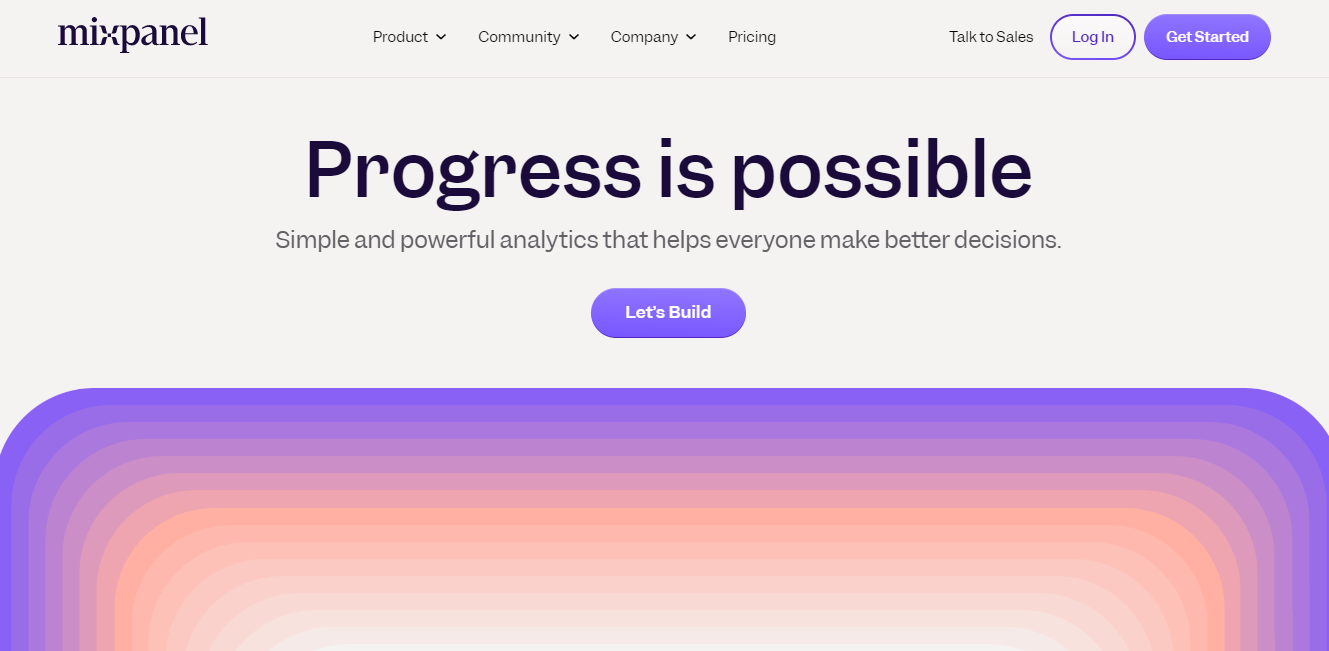
Mixpanel is a widely-used product analytics platform that focuses on tracking user engagement and behavioral analytics. It helps businesses understand user interactions, measure feature usage, and optimize product experiences to drive growth and retention.
Contentsquare
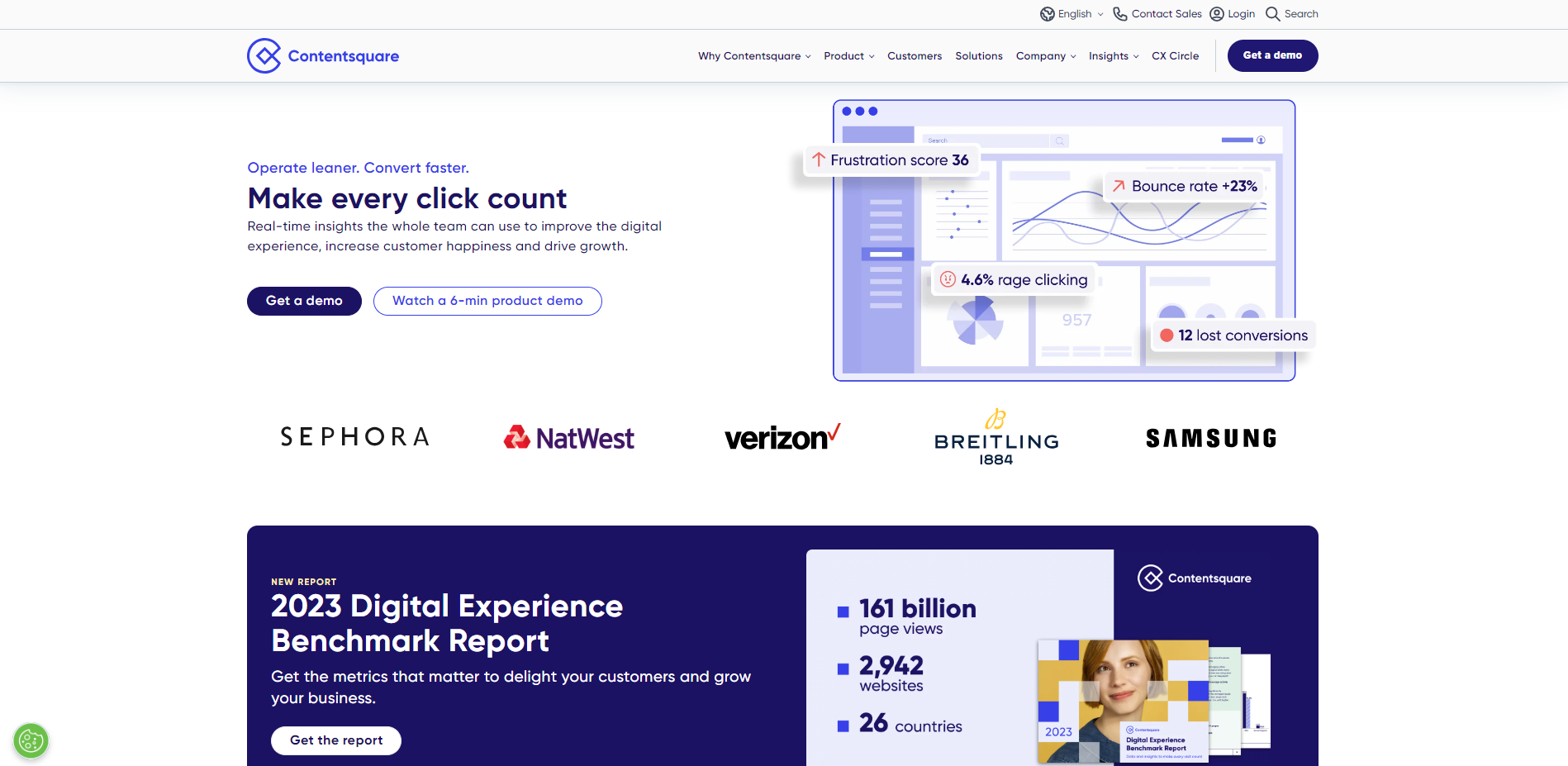
Contentsquare is a digital experience analytics platform that provides comprehensive insights into user behavior across web and mobile platforms. It offers advanced visualizations, heatmaps, and conversion funnels to understand user journeys, identify friction points, and optimize digital experiences.
How Much Does Product Intelligence Software Cost?
The cost of Product Intelligence software can vary significantly depending on several factors, including the specific features and functionalities offered, the scale of the business, the complexity of data analysis required, and the provider of the software. Here are some common pricing models and factors to consider:
Subscription-Based Pricing
Many Product Intelligence software providers offer subscription-based pricing models, where businesses pay a recurring fee based on factors such as the number of users, data volume, or specific features needed. The pricing tiers often scale based on the size and requirements of the business.
Customized Pricing
In some cases, especially for enterprise-level solutions or highly customizable platforms, the pricing is determined through customized agreements. This approach considers the specific needs and complexities of the business, resulting in tailored pricing structures.
Free or Freemium Options
Some Product Intelligence software providers offer free or freemium versions of their software, allowing businesses to access basic features or limited usage at no cost. This can be an option for smaller businesses or those looking to explore the software before committing to a paid plan.
Additional Costs
It’s important to consider any additional costs that may come with the software, such as implementation, training, data integration, or support services. These costs can vary depending on the complexity of the software and the level of support required.
Given the wide range of options available in the market, it’s recommended to reach out to software providers directly to get accurate pricing information tailored to your specific business needs.
They can provide detailed pricing structures, conduct demos, and offer guidance on selecting the most suitable plan for your requirements and budget.
Concluding Words
In the ever-evolving world of business, staying ahead requires more than just intuition—it demands the power of data-driven insights. A product intelligence platform unlocks the potential of your products, customers, and market dynamics, empowering you to make informed decisions and drive growth.
With its advanced analytics, comprehensive visibility, and actionable insights, it’s time to unleash the true potential of your business. Say goodbye to guesswork and embrace the power of product intelligence—your path to success starts now.
FAQs
What is product intelligence?
Product intelligence refers to the process of collecting, analyzing, and interpreting data and insights related to a product or service. It involves leveraging various data sources and utilizing technologies such as artificial intelligence (AI), machine learning, and analytics to gain a comprehensive understanding of the product’s performance, customer preferences, market trends, and competitive landscape.
Thus, product intelligence combines data analysis, AI technologies, and market knowledge to generate actionable insights that guide strategic decisions and enable businesses to create and deliver successful products.
What are the types of intelligence products?
There are various types of intelligence products, each serving a different purpose and providing specific insights. Here are some common types of intelligence products:
- Market Intelligence
- Competitive Intelligence
- Customer Intelligence
- Product Performance Intelligence
- Social Media Intelligence
- Pricing Intelligence
- Supply Chain Intelligence
These are just a few examples of intelligence products, and the specific types can vary depending on the industry, business objectives, and available data sources. The key is to leverage relevant data and analytics techniques to generate insights that support informed decision-making and drive business growth.
What is the difference between product analytics and product intelligence?
Product analytics and product intelligence are related concepts that focus on analyzing product-related data, but they differ in their scope and approach. Here’s a breakdown of their differences:
Key Aspects | Product Analytics | Product Intelligence |
Scope | Product analytics focuses specifically on analyzing product usage, performance, and user behavior data. It primarily deals with quantitative metrics and data collected from within the product itself. | Product intelligence has a broader scope and incorporates market research, competitor analysis, and customer insights alongside product analytics. |
Data Sources | Product analytics primarily relies on data collected directly from the product, such as user interactions, events, and performance metrics. | Product intelligence integrates data from various sources such as market research reports, customer surveys, social media data, competitor analysis, and other external data sets. |
Insights and Objectives | Product analytics is primarily focused on deriving insights related to the product’s performance, user engagement, and feature usage. | Product intelligence aims to provide strategic insights that guide broader business decisions. |
Decision-Making | Product analytics primarily supports tactical and operational decision-making related to product optimization and user experience enhancements. | Product intelligence supports strategic decision-making at a higher level. |
Contextual Understanding | Product analytics provides a deep understanding of how users interact with a product and the impact of various features and changes on user behavior. | Product intelligence provides a broader contextual understanding by incorporating external market and customer insights. |
Is product intelligence the same as business intelligence?
No, product intelligence and business intelligence are not the same, although they are related concepts.
Business intelligence (BI) refers to the strategies, technologies, and practices used by businesses to analyze data and gain insights into their operations, performance, and market trends. It involves collecting and analyzing various types of data, such as sales figures, customer information, financial data, and operational metrics, to support decision-making and improve business performance.
On the other hand, product intelligence focuses specifically on analyzing data related to a company’s products or services. It involves gathering and analyzing data about product usage, customer feedback, market trends, and competitor analysis to gain insights into the performance, customer satisfaction, and potential improvements of specific products or services.
